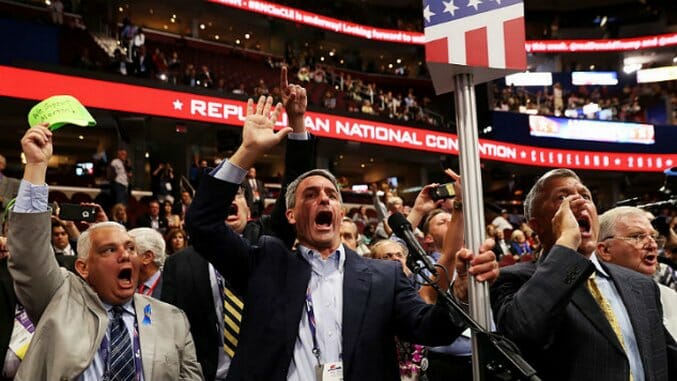The RNC Didn’t Give Us An Anti-Trump Rebellion, So Let’s Dream Up Something Seriously Wild
Photo by John Moore/Getty
The Republican National Convention has come and gone, and the Never Trump movement proved to be less open revolt on the convention floor and more a few seriously pregnant pauses in Ted Cruz’s non-endorsement speech. Donald Trump is officially the Republican nominee, so we have likely passed our last, best opportunity for electoral chaos. It wasn’t so long ago that politics dorks like me were thinking this might finally be the year of a brokered convention, or a defiant third-party candidacy from a loser in the primaries, or whatever else. But that’s all done now, so it’s time for us nerds to face up to the far more serious, real-world potential for chaos this election represents. Or, dammit, we can put off reality a little while longer by imagining the craziest, wildest electoral fever dream of them all, with a little historical spice thrown in!
Before going full political fan fiction here, let’s keep in mind the dominant narrative of Trump’s candidacy, which has been the huge disconnect between voters and the establishment. Trump has already successfully navigated all the hurdles the Republican party has put in place to prevent nominees like him, but there are still a couple rarely used, pro-establishment safeguards that go right back to the Founding Fathers. The Electoral College itself was originally conceived as a much more active intermediary between the popular vote and the eventual choice for president. The founders envisaged wise electors individually voting their conscience, with the will of the people only a relatively minor consideration. Since that pretty much immediately proved to not be how things worked out, we’ll shelve the frantic Googling of “faithless electors; for another day and consider what happens if neither Trump nor Hillary Clinton wins the needed 270 electoral votes, sending the election to the House of Representatives for the first time since 1824.
There are a handful of scenarios in which the two tie with 269 votes, but the far more fun way to get there is if other candidate(s) pick off a few key states. We could focus on Gary Johnson here—perhaps some big-money donors have officially had enough after the convention and throw some super PAC money his way—but let’s instead consider a modified version of a plan Republican insiders were reportedly considering a few months back, in which candidates run independent campaigns in specific regions. And who better to put forward for such a task than the two men who did best again Trump in the primaries, Ted Cruz and John Kasich? It’s too late to launch viable national campaigns, but there’s still just enough time for them to file in a few key states. For Cruz, he can capitalize on Mormons’ deep-seated dislike of Trump by targeting western states he previously won: Utah, Idaho, and Wyoming, all of which have filing deadlines between August 15 and 30. He could also go after Kansas, though there he would need to find 5,000 signatures by August 1. As for Kasich, his region is, well, basically just Ohio, but someone absolutely has to win a swing state like that for this cockamamie scheme to work.
Here’s an electoral map in which Kasich takes Ohio and Cruz takes those four western states:

Trump has done relatively well otherwise, taking Florida and Pennsylvania, leaving him at 236 and Clinton at 265. Doing some quick addition with Cruz’s four states reveals why I suggested he go after Kansas as well as the Mormon bloc: By winning all four, he cobbles together 19 electoral votes to Kasich’s 18 in Ohio. (This despite Ohio having three million more people in it than those four states combined.) That matters because, according to the 12th Amendment, the House only considers the top three finishers in the Electoral College, meaning Cruz and Kasich would be in a de facto head-to-head race for the all-important bronze medal.
-

-

-

-

-

-

-

-

-

-

-

-

-

-

-

-

-

-

-

-

-

-

-

-

-

-

-

-

-

-

-

-

-

-

-

-

-

-

-

-








































